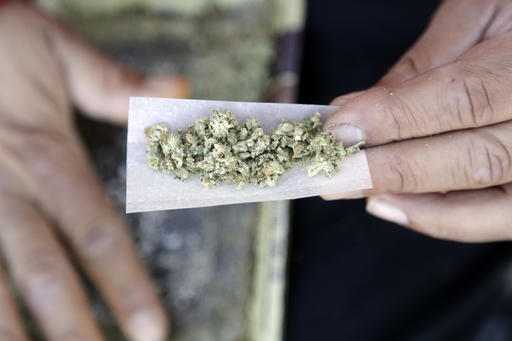WASHINGTON (AP) — The Justice Department will try to adopt “responsible policies” for enforcement of federal anti-marijuana laws, Attorney General Jeff Sessions says, adding that he believes violence surrounds sales and use of the drug in the U.S.
In a meeting with reporters Monday, Sessions said the department was reviewing an Obama administration Justice Department memo that gave states flexibility in passing marijuana laws.
“Experts are telling me there’s more violence around marijuana than one would think,” Sessions said.
The comments were in keeping with remarks last week from White House spokesman Sean Spicer, who said the Justice Department would step up enforcement of federal law against recreational marijuana. Sessions stopped short of saying what he would do, but said he doesn’t think America will be a better place with “more people smoking pot.”
“I am definitely not a fan of expanded use of marijuana,” he said. “But states, they can pass the laws they choose. I would just say, it does remain a violation of federal law to distribute marijuana throughout any place in the United States, whether a state legalizes it or not.”
Eight states and the District of Columbia have legalized marijuana for recreational use. The Justice Department has several options available should it decide to enforce the federal law, including filing lawsuits on the grounds that state laws regulating pot are unconstitutional because they are pre-empted by federal law.
Studies have found no correlation between legalization of marijuana and violent crime rates. But law enforcement officials in states such as Colorado say drug traffickers have taken advantage of lax marijuana laws to hide in plain sight, illegally growing and shipping the drug across state lines, where it can sell for much higher.
Pot advocates say the officials have exaggerated the problem.
“You can’t sue somebody for a drug debt. The only way to get your money is through strong-arm tactics, and violence tends to follow that,” Sessions said.
Sessions said he met with Nebraska’s attorney general, who sued Colorado for allegedly not keeping marijuana within its borders. That lawsuit was dismissed by the U.S. Supreme Court, but neighboring states continue to gripe that Colorado and other pot-legal states have not done enough to keep the drug from crossing their borders.
Copyright 2017 The Associated Press. All rights reserved. This material may not be published, broadcast, rewritten or redistributed.







because, of course there’s no violence around alcohol…
You could if the drug in question was legalized.
Bothsiderism. Law enorcement officials say lots of unsupported nonsense if it serves their biases. As for selling it for higher prices outside the State…well, that’s the “free market” economy for you. 'Course it’s really not “free”, but you get my meaning. Oh., and drug traffickers “hanging around” doesn’t seem very violent to me.
Sessions is still living in Reefer Madness world.
Sessions: We reserve the right to use the marijuana issue as a tool to criminalize and lock up black people.